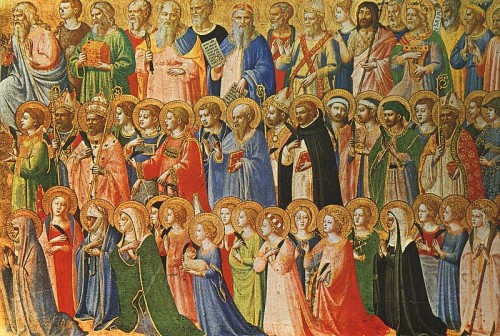
All Saints Feastday
-A few notes-
Explanation for todays Homily format: Unfortunately we cannot bring you our usual range of writers of homily notes as none cover This day specificall as it only turns up once every seven or so years.
We offer these few historical ideas for your consideration.
Q: What is all Saints day?
A: It celebrates the lives of all Christians who have died in a state of grace. …Scott P Richertr
Q When Is All Saints Day 2015?
A: Today, Sunday, November 1, 2015.
Q; Any history of the day?
A: All Saints’ Day, also known as All Hallows, Day of All the Saints, Solemnity of All Saints, or Feast of All Saints is a solemnity celebrated on 1 November by the Roman Catholic Church and various Protestant denominations, and on the first Sunday after Pentecost in Eastern Catholicism and Eastern Orthodoxy, in honour of all the saints, known and unknown.In Catholic theology, the day commemorates all those who have attained the beatific vision in Heaven. …Wikipedia

Q. What has that to do with All Hallows?
A. All Hallows or Hallowmas is another term for the feast.The latter was used by Shakespeare in this sense. However, a few recent writers have applied this term to the three days from 31 October to 2 November inclusive, as a synonym for the triduum of Hallowtide….Wikipedia
Q: How did it all start?
A: Eastern Church:The feast of All Saints achieved great prominence in the ninth century, in the reign of the Byzantine Emperor, Leo VI “the Wise” (886–911). His wife, Empress Theophano – commemorated on 16 December – lived a devout life. After her death in 893, her husband built a church, intending to dedicate it to her. When he was forbidden to do so, he decided to dedicate it to “All Saints”, so that if his wife were in fact one of the righteous, she would also be honored whenever the feast was celebrated.According to tradition, it was Leo who expanded the feast from a commemoration of All Martyrs to a general commemoration of All Saints, whether martyrs or not….Wikipedia
Q. How about the Western Church?
A. In the Western Church: In the early days the Christians were accustomed to solemnize the anniversary of a martyr’s death for Christ at the place of martyrdom. In the fourth century, neighbouring dioceses began to interchange feasts, to transfer relics, to divide them, and to join in a common feast; as is shown by the invitation of St. Basil of Caesarea (397) to the bishops of the province of Pontus. In the persecution of Diocletian the number of martyrs became so great that a separate day could not be assigned to each. But the Church, feeling that every martyr should be venerated, appointed a common day for all. The first trace of this we find in Antioch on the Sunday after Pentecost. We also find mention of a common day in a sermon of St. Ephrem the Syrian (373), and in the 74th homily of St. John Chrysostom (407). At first only martyrs and St. John the Baptist were honored by a special day. As early as 411 there is in the Chaldean Calendar a “Commemoratio Confessorum” for the Friday after Easter. …Wikipedia
Q. And?
A. On 13 May 609 or 610, Pope Boniface IV consecrated the Pantheon at Rome to the Blessed Virgin and all the martyrs, ordering an anniversary; the feast of the dedicatio Sanctae Mariae ad Martyres has been celebrated at Rome ever since. There is evidence that from the fifth through the seventh centuries there existed in certain places and at sporadic intervals a feast date on 13 May to celebrate the holy martyrs. The origin of All Saints’ Day cannot be traced with certainty, and it has been observed on various days in different places.Q.
Q.What is the Novenber connection?
A November festival of all the saints was already widely celebrated on 1 November in the days of Charlemagne. It was made a day of obligation throughout the Frankish empire in 835, by a decree of Louis the Pious, issued “at the instance of Pope Gregory IV and with the assent of all the bishops”, which confirmed its celebration on 1 November. The octave was added by Pope Sixtus IV (1471–1484)….Wikipedia
*******************
Fear not, we will be back to our usual format next Monday – Please God says you
Thank you for you patience